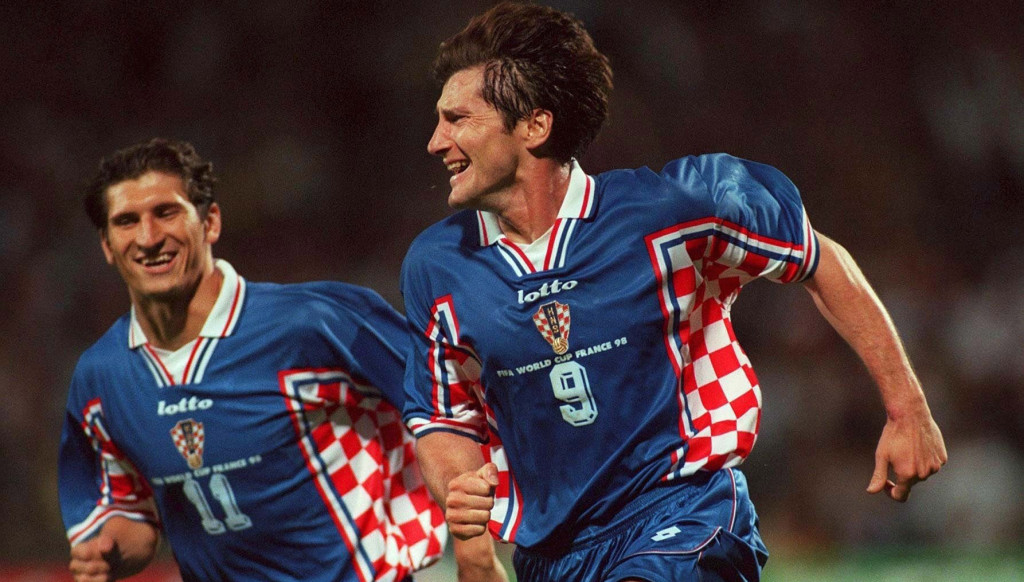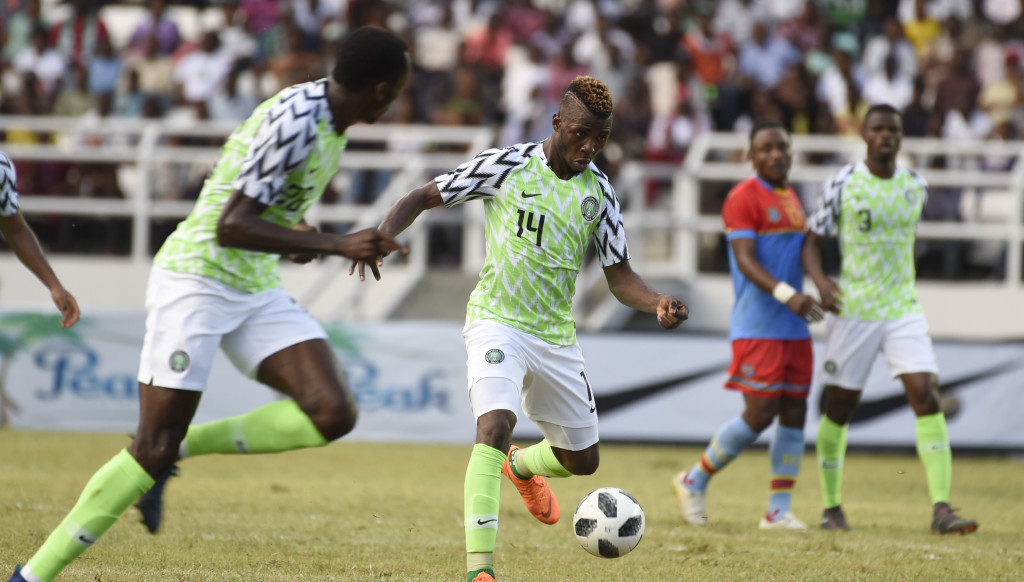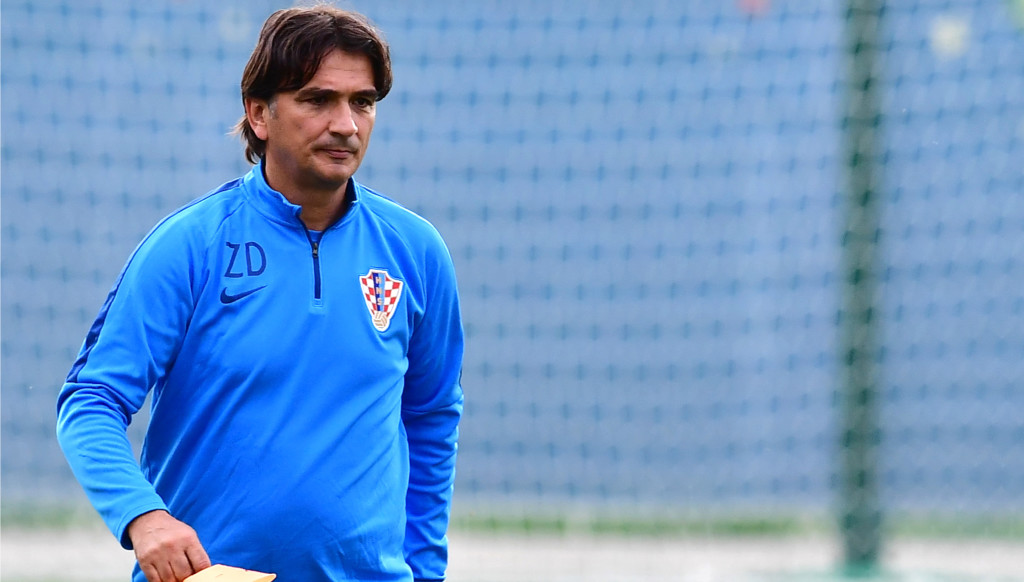
Croatia and Nigeria meet in Group D at the World Cup, with both looking for a vital opening victory with Argentina lying in wait.
There’s plenty of talent bubbling in both camps, from Croatia’s mesmeric midfield to a Super Eagles side packed with pace and youth. Here, we look at three talking points ahead of the game.
CROATIA’S FALL FROM GRACE

Davor Suker was sensational for Croatia at the 1998 World Cup.
Croatia have crashed and burned since burning bright on their brilliant debut 20 years ago.
Since stunning the world in France – eight short years after anything resembling a modern-day Croatia came to prominence (it would be 1993 until the nation was officially recognised by FIFA and UEFA) – it’s been a veritable smorgasbord of regret and disappointment for the fledgling nation.
Their World Cup record since 1998’s run to the semi-finals reads: 2002 group stage, 2006 group stage, 2010 failed to qualify, 2014 group stage.
Croatia have won only one of their last seven World Cup games (D2 L4), a 4-0 thrashing of Cameroon in Brazil, which ultimately proved anti-climactic as they failed to progress beyond the group yet again, their sole triumph.
Who can forget that magical run to third place in 1998, and the star-studded team that carried them there.
Having narrowly missed out on World Cup 1994 because their formation was ratified after the qualifiers started, they certainly made up for lost time on the international stage four years later.
Jamaica and Japan were swept aside, Croatia losing 1-0 to Argentina and qualifying second behind the South Americans. Romania were dispatched in the last 16 before a statement 3-0 demolition of 10-man Germany in the quarter-finals saw them reach the last four.
There the dream ended at the hands of eventual champions France, but they ended on a high as the Netherlands were beaten 2-1 in the third-place play-off.
It was always going to be hard to emulate that unfathomable high, but this generation has still underwhelmed.
They may not be the golden generation of Robert Prosinecki, Davor Suker, Zvonimir Boban and Goran Vlaovic, but Luka Modric, Ivan Rakitic, Ivan Perisic and Mario Mandzukic should have mustered more in the intervening years.
In Russia, they have the chance to make amends. And with a majestic midfield supplementing an able attack, a deep run is a distinct possibility.
YOUTH V EXPERIENCE

Kelechi Iheanacho is one of a plethora of young stars for Nigeria.
On the opening day of the tournament, Nigeria’s squad will have an average age of 25 years and 336 days, the youngest of any team in the competition.
Croatia’s is not one of the oldest – their average age of 27.9 years places them 18th of the 32 teams – but they have a wealth of talent at their disposal, not to mention experience.
Captain Luka Modric has earned 106 caps for Valtreni, while veteran Lokomotiv Moscow centre-back Vedran Corluka is on the verge of reaching a century (99). Barcelona pivot Rakitic is also approaching 100 (92) as is Juventus striker Mandzukic (83).
Inter Milan forward Perisic (62) and Besiktas defender Domagoj Vida (59) are both on the way to 100, while AC Milan duo Ivan Strinic (43) and Nikola Kalinic (41), Real Madrid talent Mateo Kovacic (41), Liverpool defender Dejan Lovren (39), Monaco stopper Danijel Subasic, Fiorentina wideman Milan Badelj (both 38), lively Atletico Madrid full-back Sime Vrsaljko, Rijeka’s Filip Bradaric, Internazionale midfielder Marcelo Brozovic (all 35) and Hoffenheim attacker Andrej Kramaric (31) are all well on the way to the half-century mark.
All these caps piling up, on top of the masses of silverware the likes of Modric and Kovacic, Rakitic, Mandzukic and Vrsaljko are hoarding, means Croatia head into the tournament with a weight of confidence behind them.
On the other hand, Nigeria’s squad features 12 players aged 25 or under while six of Gernot Rohr’s 23 players have played less than 10 times for their country.
But what Rohr’s side lack in experience, they make up for in pace and sheer excitement.
A midfield anchored diligently by John Obi Mikel and Wilfred Ndidi allows the likes of Victor Moses, Alex Iwobi, Ahmed Musa and Kelechi Iheanacho to flourish going forward, with the Super Eagles scoring a joint-high 11 goals in the final round of African qualifying.
They will have high hopes of making the knockout stages for a fourth time in six finals appearances.
DALIC MAKING A NAME FOR HIMSELF

Croatia coach Zlatko Dalic.
Many casual football fans would have scratched their heads and asked ‘who?’ when Zlatko Dalic replaced Ante Cacic as Croatia coach in the middle of the qualifying campaign.
But to UAE football fans, Dalic is remembered as the man who cemented Al Ain’s reputation as the most successful club in the country’s history, providing Emirati poster boy Omar Abdulrahman with the means to make his meteoric rise to stardom.
Croatia’s Under-21 assistant coach from 2006-11, Dalic has largely walked a nomadic managerial path that meandered around the Middle East, where he has occupied several posts since 2010.
Saudi Arabia stints with Al Faisaly and then Al Hilal were fairly unspectacular, before Dalic rose to prominence in a glorious three-year term with UAE giants Al Ain from 2014-17.
He had the unenviable task of replacing the enigmatic and outspoken, but successful, Cosmin Olaroiu who won back-to-back Arabian Gulf League titles from 2011-13.
The AGL title was lifted again in 2014/15 under Dalic, the much celebrated President’s Cup in 2014 and the Arabian Gulf Super Cup in 2015 – while the Boss came perilously close to being crowned Asia’s best side for a second time in 2016 when they lost in the final of the AFC Champions League to Jeonbuk Hyundai Motors.
And whatever reservations Croatian fans might have had when he was appointed to the country’s top job, they were allayed in just his first three games.
Coming in as their campaign was flagging, Dalic led the Croats to two wins and a draw which sealed their spot in Russia.
His bold ploy of pushing Modric further up the field also raised eyebrows but paid dividends.
There is, however, a concern with a lack of goals despite the attacking armory at his disposal. Croatia scored just 15 goals in qualifying, the lowest tally of all European teams to reach Russia.